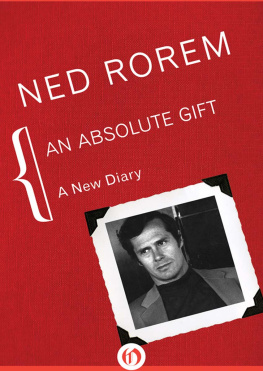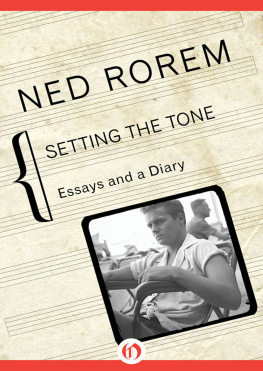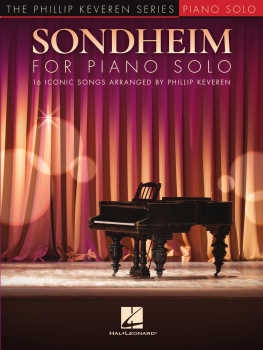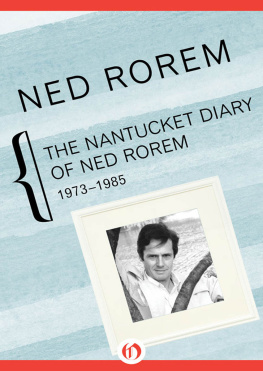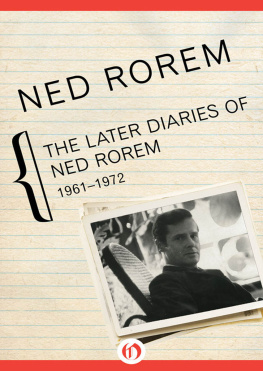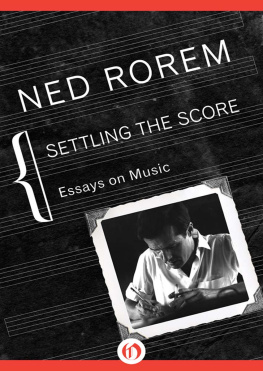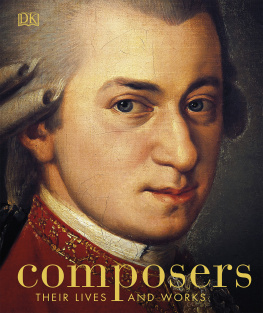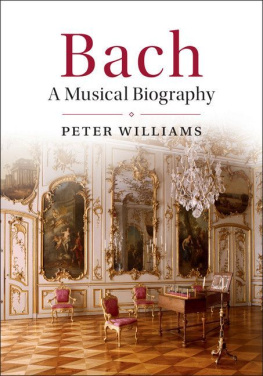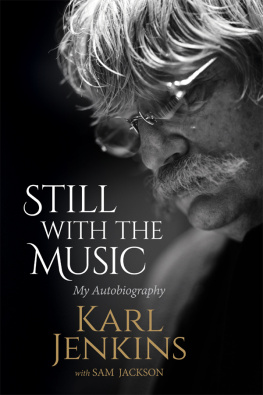
NED ROREM
An
Absolute Gift
A NEW DIARY


The author gratefully acknowledges permission to reproduce the following material:
From The Young Christ by Frank OHara in Collected Poems of Frank OHara, copyright 1971 by Marie Granville-Smith, administratrix of the estate of Frank OHara, published by Alfred A. Knopf.
From The Composer by W. H. Auden in Collected Poems by W. H. Auden, copyright 1940, renewed copyright 1968 by W. H. Auden, published by Random House.
Bagzh (article on Nabokov) and Song by Ned Rorem, copyright 1975 by The New York Times Company.
To James Holmes
De nouveau et toujours le soutien et la source

1. Why I Write as I Do
What can be told about music that the music itself cant tell? Only how it came to be written.
It is instructive to hear what one composer says about another because, no matter how biased, he quite knows what hes talking about. It is less instructive to hear what a composer says about himself because, no matter how sincere, he doesnt quite know what hes talking about. A composer can clarify his method to others, but not his esthetic. He can tell how he wrote his piece, but not why. His why is the piece. All else is a smokescreen through which he explains what youre supposed to hear rather than what you do hear. Unless the smokescreen itself is his music.
A smokescreen is handy but fragile. Let me show you minewhich may blow away even while Im talking.
Why do I compose the way I do?
What way is that? As with affairs of the heart each time is the first time, and the way of a new composition is no more predictable than the way of true love. Rules observed last time must be broken this time; vices become virtues in a different setting.
Years later, when one or another of his ways has faded from public awareness, a composer himself finds it hard to revive the old flame, nor can he explain why the spark did or did not flare into fireworks. Of course, experience eventually teaches him how to play with fire. And it teaches him not to push comparisons: Love, even love for music, is never logical, while music, even music that inspires love, is always logical.
Why do I compose the way I do?
How answer, unless I know the effect the music has on others? That effect can never really be known, least of all while composing. While composing I can only know the effect I want to project.
No artist hopes, or even seeks, to be understood. In his heart he feels understanding to be a bit insulting: he is too complex, too special, and anyway understanding is no urgent ingredient of art as it is of more critical expressions. What he hopes for is: not to be misunderstood. For an artist, the height of misunderstanding is to be taken for clothed when in fact he is naked, to be praised for finery he has no intention of wearing.
For example. My early emigration to France was not that of an American in need of a change; I had felt myself born out of context and wanted to go back to a different womb. When I first played my pieces for my new countrymen I experienced relief and elation to be finally spilling forth my oh-so-sensual Gallic wit to comprehending ears. Now, their reaction was: Why so cold and humorless, Ned, so Nordic and inhibited? Be more French.
Do I then compose because of influences?
We all compose, probably, through the first music which attracted us. That music in turn was heard through music we already knew. Because I knew Ravel before Bach, I still hear Bach as I hear Ravel: those baroque sequences become static ninth chords. Because I knew French music before German, I still hear (and judge) German music as French. I still hear twelve-tone music as tonal, and still hear my own jagged airs as mere nursery exercises for blues singers. We all grow by taking from our predecessors. To refuse to take from them is itself a takingan affirmation. The difference between a true and false artist is the difference between a conscious and an unconscious thief. The professional disguises a theft by stamping it with his trademark. The amateur has no trademark; he doesnt know hes stolen; he peddles black-and-white reproductions.
A trademark can be a speech defect. It makes no sense to disqualify a speech defect, or even a language. Criticize only what is said in the language, and despite the defect (which may be engaging). I speak my native tongue as I can. Do you hear? Will you listen? Do I hold your interest?
Aware of those Ive robbed, I smile when others dont recognize them. Yet I make no claims to novelty. My sole originality is that Ive never sought originality. Though in the end that claim cannot apply to my music, only to a point of view about my music.
Do I compose because Ive been encouraged? Been so often singled out as a unique melodist?
Im not a unique melodist. I am a setter of literature, which has no special claim to tunes. Any uniqueness springs from an unactive competitionat least in the domain of recital song. Every composer worthy of the name is essentially a vocal composer, be his medium a quintet of horns, a percussion ensemble, an electronic synthesizer. He is a setter of literature which makes no special claim to words. Inasmuch as Ive beenagainst my willpigeonholed as a songwriter I have, yes, been encouraged. Without the practicalities of praise and performance day after day, I would have given up long ago. And each day is still touch and go. Admittedly there is a professional paradox here. Although others who know, because their ideas are published, say my reputation is that of a song composer, of the ample variety of commissions offered me over the past ten years none have been for songs.
My three mottos for songwriting: Use only good poemsthat is, convincing marvels in English of all periods. Write gracefully for the voicethat is, make the voice line as seen on paper have the arched flow which singers like to interpret. Use no trick beyond the biggest trickthat is, since singing is already such artifice, never repeat words arbitrarily, much less ask the voice to groan, shriek, or rasp. I have nothing against special effects; they are just not in my language. I betray the poet by framing his words, not by distorting them.
Why do I compose? Less from self-expression than because I want to be an audience to something that will satisfy me. The act dispels the smokescreen between my ego and reality. However my gifts may seem a luxury to others, I compose for my own necessity, because no one else makes quite the sound I wish to hear.

2. Lies
NOTES ON CRAFT
One
My work is my truth. Insofar as that work is also art it is also true for you. That that art may lie makes it no less true. A symbol posing as the real thing betrays itself, yet the betrayal cant disqualify the symbols status as symbol.
That painting theres not true to life, its scarcely true to paint. That tunes not natural, not birdsong, not winds sough, its false to outdoors. It sounds like nothing else. It lies.

